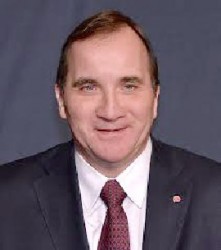STOCKHOLM, (Reuters) – Sweden’s minority, centre-left government teetered on the brink of collapse yesterday after just two months in office when a far-right party announced it would vote against the 2015 budget, effectively dooming it to defeat.
The anti-immigration Sweden Democrat party, which holds the balance of power in parliament, said it would support an alternative budget proposed by the centre-right Alliance opposition bloc, leaving the government isolated.
Prime Minister Stefan Lofven said last-ditch talks with Alliance leaders to resolve the crisis sparked by the unaligned Sweden Democrats, who want to cut the number of asylum seekers by 90 percent, had proved fruitless.

“There is no one on the other side of the table, it is meaningless to hold talks,” Lofven told reporters after the meeting at the government headquarters, saying he would decide how to proceed after today’s debate in parliament.
“We may call snap elections later, when the constitution allows. We could also resign and there are other alternatives.”
The leaders of the Moderate, Centre, Christian Democrat and Liberal parties, which make up the Alliance, stood their ground despite the olive branch offered by Lofven, saying they would not budge from their pledge to vote for their own bill.
Parliament is due to vote on the budget today.
Lofven, head of a coalition of Social Democrats and Greens, faces the risk of becoming Sweden’s shortest-serving prime minister since the 1930s, having ruled out staying in government and implementing an opposition budget.
With options rapidly running out, he could still send the budget back to committee for amendments to try to win backing from the centre-right, though prospects of success are remote. He could also resign and try to put together a new government.
A last resort would be to call a snap election – something that has not happened since 1958 – risking a period of political and market uncertainty. A vote could be called in late December at the earliest, with the elections taking place within the following three months.
“Sweden hasn’t been this close to a snap election for many decades,” said Andreas Johansson Heino, political scientist at liberal think tank Timbro.
The Swedish crown weakened after the Sweden Democrats’ decision, losing around 3 ore to stand at around 9.32 to the euro at 2250 GMT.
“In the long term, the most important thing is that we have stable government finances,” Annika Winsth, chief economist at banking group Nordea, said. “Investors are going to continue to have confidence that that is the case unless this drags on for a long time.”
IMMIGRATION KEY
The budget was meant to draw a line under eight years of tax cuts under previous centre-right administrations that made many Swedes richer, but also raised worries over declining standards in healthcare and education and over increasing social division.
The Social Democrats and Greens planned extra spending on schools, welfare and job creation financed by tax hikes, including for high-income earners.
The Alliance is proposing more cautious spending as well as vehicle tax hikes and higher duties on tobacco and alcohol.
Acting Sweden Democrat leader Mattias Karlsson said his party was flexing its muscles to force a reversal of Sweden’s generous stance on immigration. “If the Alliance doesn’t change its policies (on immigration), we would try to bring down a government of those parties too,” he said.
Costs for asylum seekers including housing, language lessons and welfare allowances totalled 1.5 percent of the country’s 2013 budget, with Sweden the biggest per-capita recipient of asylum seekers and refugees last year, according to the Organisation for Economic Co-operation and Development.
That humanitarian generosity has fed the rise of the far-right. The Sweden Democrats doubled their support in the September election, taking 13 percent of the vote and becoming the third largest party in parliament.
Mainstream parties have shunned them, and the budget gives them a rare opportunity to show their political strength.
“They have a mandate from their constituents to stir up trouble,” said Henrik Ekengren Oscarsson, professor in political science at Gothenburg University.





